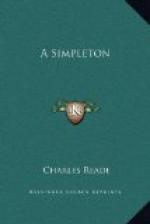“Give the boy a penny for it,” said the ingenious Falcon, on receiving the information.
“Oh!” said Staines. “Take advantage of a child?”
He borrowed it of the boy, and laid it on the table, after supper. “Sir,” said he, “this is what we were raking in your kopjes for, and could not find it. It belongs to little Hans. Will you sell it us? We are not experts, but we think it may be a diamond. We will risk ten pounds on it.”
“Ten pounds!” said the farmer. “Nay, we rob not travellers, mine vriend.”
“But if it is a diamond, it is worth a hundred. See how it gains fire in the dusk.”
In short, they forced the ten pounds on him, and next day went to work on another kopje.
But the simple farmer’s conscience smote him. It was a slack time; so he sent four Hotteatots, with shovels, to help these friendly maniacs. These worked away gayly, and the white men set up a sorting table, and sorted the stuff, and hammered the nodules, and at last found a little stone as big as a pea that refracted the light. Staines showed this to the Hottentots, and their quick eyes discovered two more that day, only smaller.
Next day, nothing but a splinter or two.
Then Staines determined to dig deeper, contrary to the general impression. He gave his reason: “Diamonds don’t fall from the sky. They work up from the ground; and clearly the heat must be greater farther down.”
Acting on this, they tried the next strata, but found it entirely barren. After that, however, they came to a fresh layer of carbonate, and here, Falcon hammering a large lump of conglomerate, out leaped, all of a sudden, a diamond big as a nut, that ran along the earth, gleaming like a star. It had polished angles and natural facets, and even a novice, with an eye in his head, could see it was a diamond of the purest water. Staines and Falcon shouted with delight, and made the blacks a present on the spot.
They showed the prize, at night, and begged the farmer to take to digging. There was ten times more money beneath his soil than on it.
Not he. He was a farmer: did not believe in diamonds. Two days afterwards, another great find. Seven small diamonds.
Next day, a stone as large as a cob-nut, and with strange and beautiful streaks. They carried it home to dinner, and set it on the table, and told the family it was worth a thousand pounds. Bulteel scarcely looked at it; but the vrow trembled and all the young folk glowered at it.
In the middle of dinner, it exploded like a cracker, and went literally into diamond-dust.
“Dere goes von tousand pounds,” said Bulteel, without moving a muscle.
Falcon swore. But Staines showed fortitude. “It was laminated,” said he, “and exposure to the air was fatal.”
Owing to the invaluable assistance of the Hottentots, they had in less than a month collected four large stones of pure water, and a wineglassful of small stones, when, one fine day, going to work calmly after breakfast, they found some tents pitched, and at least a score of dirty diggers, bearded like the pard, at work on the ground. Staines sent Falcon back to tell Bulteel, and suggest that he should at once order them off, or, better still, make terms with them. The phlegmatic Boer did neither.




